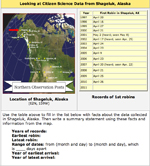| Please Report Your Sightings! |
This Week's Update Includes:
- News: What's Happening Now & What to Watch For
- Explore: Robin Nesting Cycle
- Research: Compare Division of Labor
- Latest Maps: Where Are Robins Now?
- Annual Evaluation: Please Share Your Thoughts

What's
Happening Now
Robins have reached the end of the migration trail! From our northernmost observation post in Shageluk, AK comes the happy news:
Dear Journey North,
We are SO EXCITED to be able to report our FIRST ROBIN was seen Friday, April 20, 2012! We have had nice warm temps (50s) the past two weeks despite the fact that we still have TWO FEET of snow and our lakes and rivers are still solidly frozen.
Although we haven't seen many Robins since then, we know they are here. People in Shageluk believe that some of the first birds are scouts for the other birds that come. I know the Robin we saw was sitting on the very top of a birch tree singing his heart out! That can only mean that he is saying, "I am here, Shageluk, this is where I live!"
We are so happy to have our Robins back! We are anxious for the snows to melt and happy for spring. We hope you are enjoying the weather where you are, too.
Joyanne Hamilton, Innoko River School, Shageluk, Alaska
Which Northern Observation Posts are still waiting?
What
to Watch For
- At 44 degrees N in Barrie, ON: We have a nest! Two days ago, we observed a female with nesting material and carefully watched where she went with it. Today we peeked, and there is a beautiful nest under our neighbour's deck. No eggs yet.
- At 43 degrees N in Michigan: We have our first robin's egg. I have surveillance cameras up by the nest so we can watch the progress. Yesterday our mother Robin (we've named her Evelyn after my grandmother) laid her first egg.
 |
| Data/Journal Page |
 |
| Photo: Elizabeth Howard |
 |
| Photo: Wayne Kryduba |
| Mud is Important |
 |
| Photo: Don Severson |
| Comfy & Safe: Clues |
Go Lay An Egg!
The main purpose of a robin's life is to make more robins. Migration, territory, courtship, nest building, egg laying, incubation, and care of the young—all are parts of the breeding cycle. These events happen so robins can pass their genes on to new generations. That's what robins are doing now!
Teaching Suggestion: Use the Gallery as photo prompts to showcase students' observation and descriptive writing skills. |
Concept Chart
What questions do you have about the nesting cycle of robins? Use this concept
chart to organize your questions about each stage of the cycle. Then take
our research challenge!
Research Challenge
In the same amount of time it takes for robins to collect twigs, construct
nests, and raise babies, how many facts can you collect about their nesting
cycle? As your backyard robins work to ensure a new generation, construct
a nonfiction selection by weaving together the facts you collected. Pass on
fascinating facts about the nesting cycle of robins by sharing your writing
project with others. Use the links below to get started:
- Eggstra! Eggstra! The Story of Robin Eggs
- FAQ About Robins: The Life Cycle
- FAQ About Robins: Nest and Egg Problems
- Baby Robins: Welcome to the World!
- Be Mine! Robins and Their Mates


Create a venn diagram to compare the division of labor for robins to another species, such as whooping cranes or hummingbirds, as they incubate and raise their young.

 |
 |
 |
 |
| First See (map/list) |
Waves (map/list) |
Singing (map/list) |
Earthworms (map/list) |
 |
 |
 |
 |
The
First Robin You See |
Robins
migrating in Waves |
The
First Robin You Hear Singing |
Your first sighting of Earthworms |
-
Annual Evaluation: Please Share Your Thoughts



